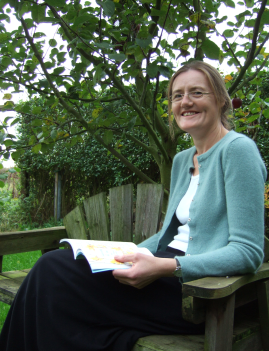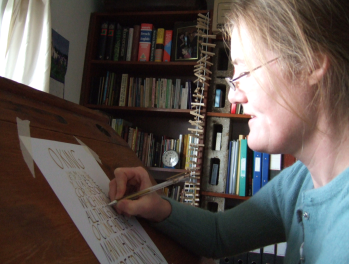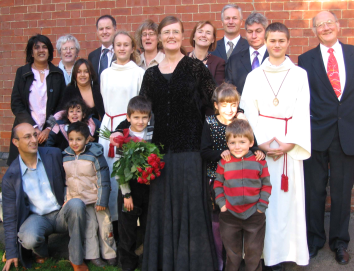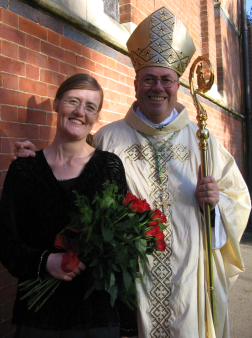
|
This article, written by Jason Hippisley, first appeared in the Market Rasen Mail (November 15th & 21st 2006), and has been reproduced here with the kind permission of the editor Jason Hippisley and photographers Jason Hippisley & Dianne Tuckett. Think of a hermit and images of beardy loners holed up in remote caves in ages past are likely to spring to mind. You wouldn't place one in an ex- When a perfectly ordinary looking woman strolls into a newspaper office and declares herself to be a hermit surely you can be excused a certain incredulity. There are no hair- Hermits just don't do that. But Rachel Denton does. Rachel is, if you like, a 21st century hermit, living in Wolds- She will receive a wedding ring and be committed to a life of celibacy, poverty, chastity and obedience in the service of God. "Saturday is about commitment, about me saying this is right for me; it's what God has called me to for the rest of my life. And about the church acknowledging that and accepting me as a hermit. It's like getting a badge to say I'm a hermit." There have always been hermits since the seventh century or so and in the last 50 years people have begun to look at it again, increasingly so in the last two decades. "It's not like it's become normal, but the church has said it's OK, that they recognise hermits." Effectively hermitage is little different to being a monk or a nun, but without the community. Immediately after university – at Newcastle where she became inspired by St Cuthbert - Ordinarily hermits adopt the solitude of hermitage after experiencing community life with the Benedictines, Dominicans, Carmelites or their like. "For someone to do it from a standing start is very unusual." So unusual in fact that she actually had to show Bishop Malcolm McMahon, head of the catholic diocese who will do the honours on Saturday, where there were measures within canon law to allow it.
Despite being almost self sufficient in fruit and vegetables, even hermits have bills to pay and to that end Rachel (43) has developed a fascination with calligraphy into a bespoke cards and stationary business operated through www.stcuthbertshouse.co.uk which she thinks sits well with her eremitical existence. Calligraphy in its way is a form of prayer, she says, observing that “rather perversely for a hermit I love words. We live in a world that sells them cheaply and so they can become cynical and meaningless. Calligraphy is a means of slowing all that down; exploring and valuing the particular form and value of each word, each phrase. Calligraphy is a product that can speak eloquently from the silence of the hermitage." "My role is prayer. I am here to pray for the church and the world and without that my life in hermitage would be meaningless, it would just be a lonely existence.
Rachel is a straight talking, personable and open sort of woman, typical of her Catholic roots in Stockport – going to St Winifred's School, later made famous with the song Grandma – Manchester and Leeds and while her family supports her destiny, they do not fully understand it.. Her aunt is a Poor Clare nun in Arundel – who featured on the TV show Convent -
GUESTS travelled from Dehli and the farthest reaches of England to be there when Rachel Denton made church history by becoming the first Hermit of the Diocese of Nottingham. As revealed in last week's Mail, Rachel has determined to devote her life to the solemnity, solitude and silence of hermitage. On Saturday she made her solemn profession as a hermit in front of family, friends and parishioners at Market Rasen's Holy Rood Catholic Church. During Mass she declared her intentions 'to live for God alone, in persevering prayer and willing penance, in humble work and holiness of life,' to Catholi Dramatically she prostrated herself before the altar during prayers to saints associated with her life, and then accepted a ring in a symbolic marriage to Christ and a crucifix to wear throughout her life. "With my whole heart I give myself to this way of life, in simplicity, solitude and silence," she said. The former secondary school science teacher and deputy head, aged 43, has established a calligraphy business in order to gain a meagre income to meet living expenses. She had been working up to the profession of her hermitage for five years since moving to the area. "I was thrilled that so many family, friends and people from the parish considered hermitage important enough to travel long distances to come and celebrate with me," she said. |


| Who was St Cuthbert? |
| About the hermitage |
| Newsletters |
| Reports & Photos |
| RPbooks |
| Rule of Life |
| How to be a Hermit |
| Rasen Mail |
| Solemn Profession Photo Gallery |
| Photos by Carlo Bevilacqua |
| Photos by Fabio |
| SCH through the seasons |
| The Seven Joys of Hermitage 1 |
| Ponderings into Solitude 1 |
| Easter Garden 1 |
| On being poorly 1 |
| Coping with change 1 |
| The Seven Joys of Hermitage 2 |
| The Seven Joys of Hermitage 3 |
| The Seven Joys of Hermitage 4 |
| The Seven Joys of Hermitage 5 |
| The Seven Joys of Hermitage 6 |
| The Seven Joys of Hermitage 7 |
| Ponderings into Solitude 2 |
| Ponderings into Solitude 3 |
| Ponderings into Solitude 4 |
| Ponderings into Solitude 5 |
| Ponderings into Solitude 6 |
| Easter Garden 2 |
| Easter Garden 3 |
| Easter Garden 4 |
| Easter Garden 5 |
| Easter Garden 6 |
| Easter Garden 7 |
| Easter Garden 8 |
| On being poorly 2 |
| On being poorly 3 |
| On being poorly 4 |
| On being poorly 5 |
| On being poorly 6 |
| On being poorly 7 |
| Coping with change 2 |
| Coping with change 3 |
| Coping with change 4 |
| Coping with change 5 |
| Job's Wife |
| Covid and Isolation |
| Waiting in the Tabernacle |
| Easter |
| Encouragement & Sympathy |
| Names |
| Birthdays |
| Church Occasions |
| Romance |
| General |
| About the cards |
| Via Lucis |
| All will be well |
| Serenity |
| Baptism |
| First Holy Communion |
| Confirmation |
| Marriage |
| Diaconal Ordination |
| Priestly Ordination |
| Anointing of the Sick |
| Requiem |
| Desert Spirituality |
| Blessings |
| Birds |
| Cats |
| Clouds |
| Girls |
| Gourmet |
| Rome |
| Winter |
| Unfinishedpoems |
| Words |
| Terms & Conditions |
| Postage & Delivery |
| Eco credentials |
| Ellie Poo |

 hat it was, a pipe dream'. He took me seriously and helped me with direction and a programme of study and preparation."
hat it was, a pipe dream'. He took me seriously and helped me with direction and a programme of study and preparation." gh. Rachel has no TV, which may not be such a bad thing, and her phone bill is only about £6 a month
gh. Rachel has no TV, which may not be such a bad thing, and her phone bill is only about £6 a month c Bishop Malcolm McMahon.
c Bishop Malcolm McMahon.